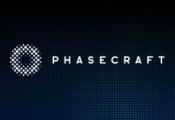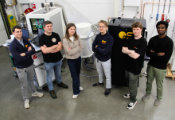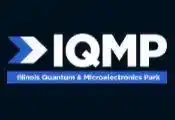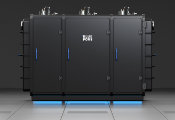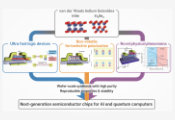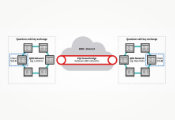Riverlane Report Reveals Scale of the Quantum Error Correction Challenge
CAMBRIDGE, UK, November 19, 2025 -- Riverlane, the global leader in quantum error correction technology, in partnership with market data and advisory provider Resonance, today released The Quantum Error Correction Report 2025. The report reveals that Quantum Error Correction (QEC) has become a "universal priority" for achieving utility-scale quantum computing. However, the report also issues a stark warning: a severe global talent crisis threatens to impede the industry's rapid progress.
The QEC Report 2025 identifies real-time QEC as the "crucial foundation" for quantum computers to surpass classical machines. Its strategic importance has doubled as a competitive differentiator since 2024, reflecting a broad industry shift towards fault-tolerant design.
"Fuelled by record investment and landmark QEC breakthroughs over the last 12 months, the quantum industry is in an urgent race to utility-scale, battling both complex technical hurdles and critical talent shortages," said Steve Brierley, CEO and Founder of Riverlane. "Real-time QEC is the cornerstone, but achieving true success demands both dedicated expertise and global, collaborative co-design across the entire quantum stack."
Today’s quantum computers have high error rates – around one error in every few hundred operations. These errors occur primarily due to the fragile nature of qubits where environmental disturbances and decoherence affect their quantum state.
Real-time QEC is the process of correcting errors in quantum computers as they happen, requiring classical decoders to operate with high speed and low latency to match the quantum computer's cycle time, often on a microsecond timescale.
The comprehensive report synthesises extensive research and insights gathered from Resonance and Riverlane, and interviews with 25 global quantum computing and QEC experts, including 2025 Nobel Laureate in Physics, John Martinis.
Key insights from the QEC Report 2025:
- Quantum computing's future hinges on real-time error correction: Real-time QEC is identified as the "crucial foundation" for quantum computers to outperform classical machines. Its importance has doubled as a competitive differentiator since 2024 amongst the world's leading quantum hardware companies.
- Google's breakthrough sparks industry shift: At the end of 2024, Google Quantum AI achieved a "landmark achievement" by proving QEC works in practice, not just in theory, dramatically reducing error rates in superconducting qubits. This has renewed optimism and spurred hardware demonstrations across various qubit types.
- Massive global funding, new leaders emerge: Global government funding for quantum computing has reached approximately $50 billion, with Japan leading the pack at $7.9 billion allocated in 2025 (surpassing the US's $7.7 billion).
- The "QEC code explosion" – a shift to practicality: Research into QEC codes has exploded, with 120 new peer-reviewed papers published in the first 10 months of 2025 (up from 36 in 2024). This signifies a clear pivot from purely theoretical work to practical experiments, with all seven profiled codes now having hardware demonstrations.
- Quantum's current real-time decoding and co-design bottlenecks: Developing fast, low-latency, and scalable "real-time decoders" for QEC is now a "critical bottleneck." This requires moving beyond software prototypes to specialised hardware like FPGAs and ASICs, with response times under 1 microsecond. A "holistic co-design" approach – integrating hardware, software, and algorithms – is essential for system-level performance.
- Looming talent crisis threatens industry growth: Despite technical advancements, the report warns of a severe talent gap in the QEC workforce, describing it as the "ultimate bottleneck." Only an estimated 600-700 professionals currently specialise in QEC worldwide, with 5,000-16,000 needed by 2030. The training required for QEC specialists can take up to 10 years, creating a critical pipeline problem.
- AI's double-edged sword: Artificial Intelligence (AI) is becoming crucial for QEC, particularly in accelerating real-time decoding and error syndrome detection. However, its own training requirements and performance scalability are still in question. AI will reshape roles, eliminating some but creating new, hybrid positions.

